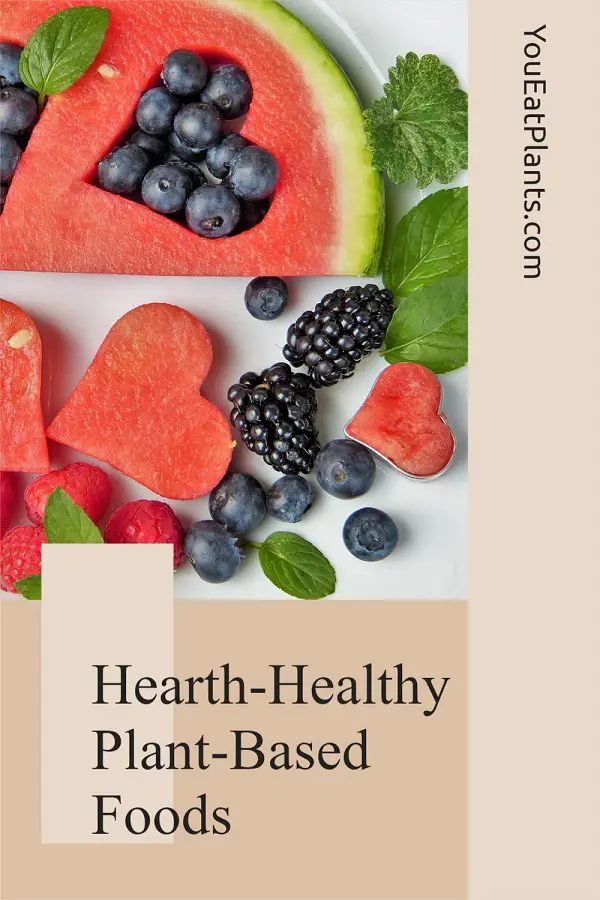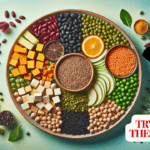
If you are looking to improve your heart health, a Plant-Based, or Whole Foods Plant-Based Diet may be just the right ingredient!
Contents
- Heart-Healthy Plant-Based Foods
- Heart-Healthy Plant-Based Food List
- Supplements and Vitamins for Heart Health
- F.A.Q. About Heart Healthy Foods
Heart-Healthy Plant-Based Foods
The plant-based diet contains many heart-healthy foods. These foods in their whole forms contain tons of nutrients, fiber, and antioxidants that are all great for heart health, and for lowering the risk of heart disease.
A plant-based diet can also help to lower sodium intake which can improve blood pressure. Plant-based foods also lower cholesterol levels which has a positive impact on heart disease.
On the other hand, animal-based foods such as meat (especially red meat and processed meat), highly processed foods like sugar, and fried foods with trans fats can have a negative effect on heart health and can increase the risk of heart disease and stroke.
Note that though some foods can be plant-based, it’s important to look for plant-based foods in their whole forms, and not broken down and stripped of certain parts and nutrients. That’s the basis for a Whole Food Plant-Based Diet.
You can learn what it is at What is the Whole Food Plant-Based Diet? and for a complete guide, visit The Whole Food Plant-Based Diet (WFPB) Beginners Guide.
Heart-Healthy Plant-Based Oils

One aspect of the original Mediterranean diet was the use of lots of heart-healthy olive oil. In fact, the Ikarian Greeks were one of the five groups who were studied in the Blue Zones project as being the longest-living and healthiest people in the world. It was these Greeks that the popular Mediterranean diet has now been based.
(However, the original Mediterranean diet actually had much less meat consumption and was mostly plant-based. I talk about that in What is the Real Mediterranean Diet? (From Crete, Greece).
If we look at what they ate, one of their staple foods was olive oil. As I explain in the WFPBNO Diet Guide, olive oil is one of those oils that are actually healthy for us, and good for the heart.
Don’t just take my word for it, look what the American Heart Association has to say about olive oil for a healthier heart. Research shows that eating more than half a tablespoon of olive oil a day for men, lowered cardiovascular disease risk by 15% and lowered the risk of coronary heart disease by 21%. Olive oil has heart-healthy monounsaturated fats, which help to lower cholesterol.
Avocado oil is also found to be a heart-healthy oil.
Heart-Healthy Vegetables
Leafy green vegetables have been found to be very good for the heart. Some studies have found that eating more of these leafy green vegetables, led to a lower risk of heart disease.
These leafy vegetables include kale, spinach, and collard greens and are high in Vitamin K which helps protect arteries and keep them flexible. Low levels of vitamin K are linked with calcification in the arteries.
These vegetables also have lots of fiber, which helps to pull excess circulating cholesterol out of the body. Lower LDL cholesterol levels lead to better heart health. And on top of all that, they have carotenoids, which are antioxidants that help battle harmful effects in the body and reduce inflammation.
Kale is also high in nitrates which increase nitric oxide in the body. Nitric oxide dilates blood vessels and helps more blood to move toward the heart and decreases blood pressure. All good things for the heart which doesn’t have to pump as hard.
Spinach is great because it contains lots of potassium. Potassium helps ease any stress on blood vessel walls.
Cruciferous vegetables such as broccoli and bok choy have vitamins C and E as well as plenty of antioxidants. These help to fight against free radicals which damage cells and can reduce the risk of heart disease. (In fact, a Whole Food Plant-Based Diet is found to lower heart disease) These vegetables also help to fight inflammation, which can be unhealthy for the heart.
Brussel Sprouts have plenty of folate in them, which lowers the amino acid homocysteine. This amino acid can damage the lining of blood vessels when it gets too high, and increase blood clotting.
Collard Greens have magnesium, which has been found to lower blood pressure in patients with high blood pressure. Magnesium may help to relax blood vessels and increase blood flow through the body and pressure on the heart.
Green Beans are packed with folate, fiber, as well as vitamins A, B and C. These antioxidants, help fight inflammation and hypertension.
Heart-Healthy Fruits
Fruits have properties that help to fight to keep the heart healthy. Fruits help to fight inflammation, which is a cause of heart disease, and they can help with blood flow to the heart, as well as helping to regulate blood pressure.
Heart-Healthy Nuts & Seeds
Nuts and seeds are great for the heart! Nuts provide Omega-3 fats (See How I Get My Plant-Based Omega-3 Fatty Acids! which are great for the heart, and nuts can lower inflammation and blood pressure, as well as bad cholesterol.
Seeds such as chia seeds also provide Omega-3 fats and also reduce blood pressure.
Heart-Healthy Beans
Beans have been found to lower bad cholesterol and reduce inflammation. A study even found that beans directly reduced heart disease by 22%.
Heart-Healthy Whole Grains
Whole grains provide lots of fiber, which helps to remove cholesterol from the bloodstream, lowering bad cholesterol. They also improve blood pressure and lower heart disease.
You can find an easy heart-healthy recipe using oatmeal at Heart-Healthy Overnight Oats.
Heart-Healthy Plant-Based Food List
Let’s look at a list of some of the best plant-based foods for heart health.
- Green Leafy Vegetables – As mentioned previously, these are loaded with fiber and other antioxidants like carotenoids to make your heart happy.
- Berries – Just like leafy vegetables, these are loaded with antioxidants as well as flavonoids called anthocyanins. All of these help fight inflammation which causes heart disease and decreases blood pressure. An analysis of 22 studies found that eating berries lowered LDL “bad” cholesterol, inflammation, and blood pressure. Another found that blueberries improved the function of cells lining blood vessel walls.
- Nuts, Walnuts, Almonds – Nuts have heart-healthy fiber. And they contain vitamin E which helps lower bad cholesterol. Eating walnuts were found to lower LDL cholesterol, inflammation, oxidative stress, and blood pressure. Walnuts and some other kinds of nuts are high in a plant-based omega-3 fatty acid called ALA. ALA improves inflammation and circulation. Some studies have found a link between eating nuts and lowered risk of heart disease. Almonds were found to possibly increase HDL or good cholesterol, which can reduce the buildup of plaque in the arteries.
- Oatmeal – Oatmeal has a lot of soluble fiber which can soak up cholesterol and remove it from the body, thus lowering cholesterol.
- Green Tea or Matcha– Green tea has tons of health benefits. It contains polyphenols and catechins which protect heart health, reduce inflammation, and prevent cell damage. Green tea was also found to lower blood pressure and LDL levels. A 2013 study found those drinking four or more cups of green tea a day had a 20% lower risk for heart disease and stroke. A previous study found lower deaths and heart disease among green tea drinkers.
- Olive Oil – As noted earlier, olive oil is very good for the heart. It has lots of antioxidants and is anti-inflammatory. A lot of studies have shown that it reduces the risk of heart disease. One, in particular, showed a 48% lower chance of heart disease mortality from a high intake of olive oil. Olive oil was also found to lower blood pressure. And another study found those at a high risk for heart disease who followed a Mediterranean diet (plant-based foods) with nuts and at least four tablespoons a day of olive oil, reduced their risk of heart attack, stroke, and mortality by 30%
- Whole Grains – Whole grains are grains that are in their whole form and not refined. This includes oatmeal, rye, quinoa, barley, brown rice, buckwheat, and whole wheat (but not wheat flour). It’s important to note that you should try to avoid products that have the ingredient wheat flour, whole wheat flour, or enriched flour. The wheat is no longer in its whole form. Look for Ezekiel bread when buying bread, since it keeps the wheat in the whole form and never uses flour. Whole grains are high in fiber which helps to lower bad cholesterol, reduce heart disease, and lower blood pressure.
- Beans / Legumes – Studies have found beans to be very good for the heart (Remember the old song we sang as kids?). They have been found to decrease the risk of heart disease. One study found those who ate beans at least four times a week had a 22% lower risk of heart disease. They have been found to lower bad LDL cholesterol levels and reduce blood pressure and inflammation. They also have resistant starch which improves heart health by improving cholesterol levels and triglyceride levels. Beans may also help with blood sugar levels.
- Seeds – Hemp seeds, chia seeds, and flax seeds are great sources of fiber and plant-based omega-3s. They have been shown to reduce LDL cholesterol and decrease blood pressure. Also, tahini, which is made from sesame seeds, has been shown to lower cholesterol and improve artery healthy.
- Soy – Soy products such as tofu or edamame are found to be very beneficial for the heart. Soy contains isoflavones which can lower cholesterol and improve the health of the heart. One study found those eating at least one serving of tofu a week saw an 18% lower risk of heart disease.
- Garlic and Onions – You may have seen a product called Garlique promoted for heart health. This is because garlic has been found to be extremely beneficial to heart health. Garlic has a substance called allicin which helps to give it these great heart benefits. Garlic was also found to lower LDL cholesterol and prevent platelet buildup to reduce the risk of blood clots. One study found that garlic lowered blood pressure more than a prescription drug. It’s best to eat garlic in its raw form for the most potency. One 2017 study found that adults who consumed more garlic and onions had a 64% less chance of cardiovascular disease.
- Dark Chocolate – Studies have shown that those eating more dark chocolate had lower risks for heart disease and calcified plaque in the arteries. Dark chocolate contains flavonoids called polyphenols, which might help blood pressure, inflammation, and clotting. But it needs to be dark chocolate, anything that is at least 70% cocoa. Milk chocolate on the other hand has less cocoa and more added sugar. Another even better option is to grab some cacao powder or cacao nibs which are pure unprocessed cocoa with no added sugars.
- Tomatoes – One review found that eating foods higher in lycopene, a powerful antioxidant found in plants, led to a lower risk of heart disease and stroke. In the reverse, low levels of lycopene in the blood have been connected with higher risks for heart attack or stroke. Tomatoes are high in lycopene which can reduce inflammation and oxidative stress. One study found that women eating raw tomatoes saw an increase in good HDL cholesterol. This good cholesterol can help to remove cholesterol and plaque from the arteries. Tomatoes are also high in potassium which is good for blood pressure.
- Citrus Fruits – One study found women eating more citrus fruits like oranges and grapefruits had less risk of ischemic stroke.
- Potatoes – If potatoes are prepared in a healthy manner and not deep-fried to make French fries, then they are great for the heart. They contain lots of potassium which lowers blood pressure. And they have lots of fiber which can help prevent heart disease.
- Coffee – It was found that drinking two cups of coffee might lower cardiovascular disease risk and stroke by 30%. Coffee, like green tea, has some natural antioxidants.
- Avocados – Avocados like olive oil are high in heart-healthy monounsaturated fats. Monounsaturated fats can lower cholesterol levels and heart disease risk. Avocados are also high in potassium which can lower blood pressure. One study found that eating avocados reduced bad cholesterol. As a final benefit, avocados have plenty of antioxidants.
- Pomegranates – Pomegranates have polyphenols and anthocyanins, which are antioxidants that help fight against artery hardening. One study showed an improvement in blood flow to the heart for heart disease patients who started drinking a serving of pomegranate juice daily.
- Apples – In a study, it was found that middle-aged adults who ate one apple a day, reduced a substance that leads to artery hardening by 40%.
- Beets – Beets have Betalains, which provide antioxidant and anti-inflammatory benefits. They can also decrease blood pressure by dilating blood vessels.
- Peppers – Spicy peppers and chili peppers have anti-inflammatory benefits. Plus, they have been shown to lower cholesterol and blood pressure, and improve blood circulation.
As you can see from the list of foods that are good for the heart, plant-based foods are packed with tons of benefits for your heart’s health. Sticking to a Whole Food Plant-Based (WFPB) Diet should help to either improve your heart health or keep it healthy. Dr. Campbell even mentions the possibility of reversing heart disease.
Supplements and Vitamins for Heart Health
I think that if you are doing a Whole Food Plant-Based Diet you will be getting plenty of the proper nutrition from the foods you eat. Just as Dr. Campbell says, there is no need to really supplement or take these vitamins, which are foods broken down into parts.
As we saw above, so many plant-based foods are very good for the heart. Most vitamins or supplements for the heart, just mimic or have the same ingredients as what we find in whole foods.
A lot of studies were done on people just eating the whole foods listed above, and not taking vitamins or supplements. They were able to see improvements just from the foods themselves. Plus, it can be much cheaper.
In fact, according to John Hopkins, their research shows that vitamins and supplements had no effect on preventing heart disease compared to placebos. The only thing that might be beneficial is an omega-3. But you can get plenty of these from chia seeds, hemp seeds, flax seeds olive oil, nuts, and avocados. (See my post on How I Get My Plant-Based Omega-3 Fatty Acids!)
They even say what I was saying previously, the best source of vitamins and supplements is from food. And in the food, you can get much higher amounts of antioxidants, than from a small supplement. They also state there is a risk to taking vitamins and supplements, and you don’t always know if you are getting what the label actually states.
The only one that you may consider supplementing with might be Garlique. And this is because, for many people, garlic can be uncomfortable to consume raw, and it might cause your breath to have a strong garlic flavor afterward.
F.A.Q. About Heart Healthy Foods
Are Nuts Heart-Healthy?
Nuts are very heart-healthy. They are a good source of unsaturated fats. There are studies linking nuts to a lower risk of heart disease. Nuts have fiber which is good for your heart and vitamin E which lowers bad cholesterol. Walnuts and some other nuts have the fatty acid ALA, which helps blood circulation and inflammation.
Walnuts have been found to lower “bad” LDL cholesterol and decrease inflammation and oxidative stress. And they have a positive effect on blood pressure.
Almonds have been found to raise good cholesterol levels. Eat nuts whenever you can as a snack that is easy to take with you and very convenient.
Also, try to use different nut butter such as almond butter, peanut butter, and sunflower butter. Another option is to bake with almond flour instead of regular or wheat flour.
Are Eggs Heart-Healthy?
Eggs have a lot of cholesterol in the yolks, so there are some questions about them and their effect on heart health. One study found that up to an egg a day in Chinese adults lowered the risk of heart disease.
Another study found that eating up to 12 eggs a week for three months did not increase cardiovascular risk in those studied.
The American Heart Association recommends one egg per day or two egg whites for those who eat them but don’t overdo it. Also remember, eggs still are a source that has a higher amount of the amino acid leucine, even if not as high as meat or dairy.
Animal-based protein sources should be minimized or completely removed for optimum health.
Are Potatoes Heart-Healthy?
Yes! Potatoes, as long as they are not deep-fried to make french fries or loaded with sour cream and cheese, can be great for the heart. They have potassium which lowers blood pressure and lots of fiber which is beneficial against heart disease.
Is Cheese Heart-Healthy?
Cheese is not very good for heart health. Cheese is high in sodium and saturated fats. All of which can increase blood pressure and raise bad cholesterol. Bad cholesterol contributes to heart disease.
While it is better for the heart than red meat, researchers found that replacing cheese with plant-based fats, lowered the risk of heart disease by 24%. Dr. Hennessey in The Heart-Healthy Diet of a Cardiologist – Foods for Heart Health admits it’s not good, but will eat small amounts of cheese on occasion.
Lance has been passionate about the plant-based diet and we have been following a whole food plant-based diet for over 5 years. We focus on health, natural healing, weight management, animal rights, and the health of the planet and environment by focusing on whole plant-based foods and sustainable practices.
Learn more at the About Me page and follow on social media at the links below.




